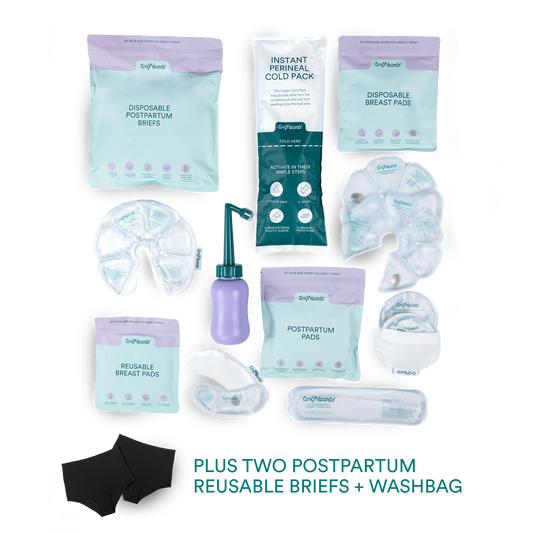Apart from some pretty bad morning sickness in the first trimester, my pregnancy started off pretty uneventful. I was super excited to experience pregnancy and birth and was accepted into a low-risk midwifery program with the hopes of having a home birth.
At the morphology scan, it was discovered that I had a complete placenta previa. This means that the placenta was covering the opening of the uterus into the cervix. I was put on pelvic rest (no sex or orgasms!) and told that I would most likely need to have a caesarean and that I would be referred to the hospital as high risk. This meant I had to mentally prepare for a completely different birth than I was previously expected, but I still had hopes that my placenta would move as my uterus continued to grow.
At 29 weeks and one day, I woke up at 4:45 am and quickly realised I was bleeding. I rushed to the bathroom, and blood spilled into the toilet. I woke my partner up and told him we had to go to the hospital, and quickly packed a change of clothes. The drive to the hospital is about an hour and a half, and I had stopped bleeding by the time I got there. The obstetrician estimated that I had only lost about 50-100ml, but I had to stay in the birth suite on a CTG monitor until I could get an ultrasound with maternal-fetal medicine in the afternoon. I was also given my first round of steroids to help my babies lungs, and NICU was told to get a bed ready.
After a long day of waiting and not knowing what to expect, I went to the MFM ultrasound, and the sonographer found that the placenta had moved about 2cm from my cervix to a low lying left lateral position. However, using colour dopplers, the sonographer discovered I had vasa previa, which meant a fetal blood vessel was across my cervix, unprotected by either the umbilical cord or the placenta.
I was informed that I would be admitted to the hospital until delivery which would be scheduled between 34 and 36 weeks. The biggest risk was that if the membranes ruptured, it would most likely cause damage to the fetal blood vessel, and my baby girl would be stillborn. I was very lucky to be diagnosed with vasa previa as undiagnosed; the fetal mortality rate is around 60-70%.
While I was in hospital, I haemorrhaged another five times. Always between 10 pm and 4 am. Every time it happened, the emergency button was pressed, and lots of people would come into the room. I would have a cannula inserted, a speculum performed, and a CTG monitor put on. When babies heartbeat was detected, then there was a sense of relief, but I was still prepped for an emergency caesarean and moved from the ward to the birth suite for 24 hours of monitoring.
I will never forget the look on the obstetricians face the first time I haemorrhaged in hospital at 31 weeks and three days, and they performed a speculum, and lots more blood gushed out onto the hospital bed. She looked at me and said, "I think we will be delivering your baby tonight". My bed was rushed down the hallway to the birth suite next to the operating room, and they did a bedside ultrasound. Luckily, she detected normal blood flow through the brain, and it was determined that the bleeding was not coming from the fetal blood vessel.
The last two times I haemorrhaged, it was almost exactly 24 hours apart, and I also experienced contractions about 5 minutes apart and 1 minute in length. The next morning, the decision was made to schedule my caesarean for the following day at 34 weeks and three days. I was given a rescue dose of steroids and moved to the birth suite for the last time.







After the initial hand express, I used a double pump and expressed three hourly and would walk to NICU to give it to the nurses for her next feed. Due to the c section's pain, I had to hold myself up on the wall as I walked down the hospital corridor and down the elevator to NICU. It was all worth it as when she was discharged, and she was exclusively breastfed.
We left the hospital when she was 36 weeks and one day old and have both been happy and healthy since. In a way, I was very lucky to have that first haemorrhage as it led to the vasa previa diagnosis, which meant my pregnancy was managed appropriately, and my baby was born early but alive.









